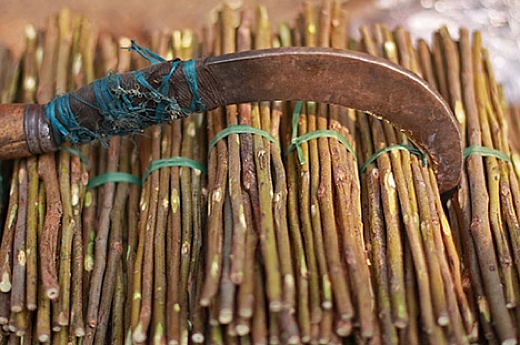 Image above: Neem twigs for sale, photo: Meena Kadri/Creative Commons
Image above: Neem twigs for sale, photo: Meena Kadri/Creative Commons
The president of the Association of Manufacturers of Ayurvedic Medicine says that the patent is bogus because the ingredients date back to antiquity and have been used in traditional medicine for thousands of years--clove oil, camphor, black pepper and spearmint.
Colgate Palmolive claims that their groundbreaking "red herbal dentifrice" uses red iron oxide, which is different than the ingredients in the traditional toothpaste.
It's a battle of big business: The toothpaste sales to a huge country like India could be worth billions of dollars. But to the Indians it is a battle for their culture. Who owns India's folk medicines and how can you patent something that has been around for thousands of years?
More info: Daily Mail
India Has Declared Traditional Medicinal Recipes Un-Patentable As a developing country, India has long been concerned about intellectual property rights and the ownership of knowledge. A few years ago, Indians were shocked when an American company tried to patent turmeric--a spice and healing powder that is widely available in markets across the country.
The country also fought a 10-year battle to overturn a patent for an anti-fungal product, derived from neem that was awarded to a multinational company. The government successfully argued that the medicinal neem tree is part of traditional Indian knowledge.
In an attempt to head off further acts of biopiracy and patenting of traditional knowledge and remedies, in 2009 India legally declared all traditional medicinal recipes "public property".
So, should it be determined that Colgate's recipe has indeed existed as a traditional medicine in India, or that red iron oxide is not different enough from traditional recipes, Colgate may well have a fight ahead.
Nations Band Together Against Biopiracy India is not the only country worried about their folk heritage and its worth. Seventeen countries have come together to form the Group of Like-Minded Megadiverse Countries. The group which includes Bolivia, Brazil, Indonesia and Kenya, has been created to "act as a mechanism of cooperation to promote their interests regarding biological diversity and in particular the protection of traditional knowledge, access to genetic resources and the fair and equitable sharing of benefits derived from their use."
More on Herbal & Natural Remedies Herbal Remedies for Stress Mountain Rose Herbs Organic Essential Oils
No comments :
Post a Comment